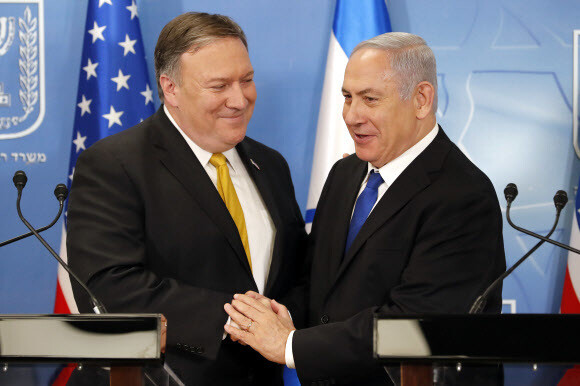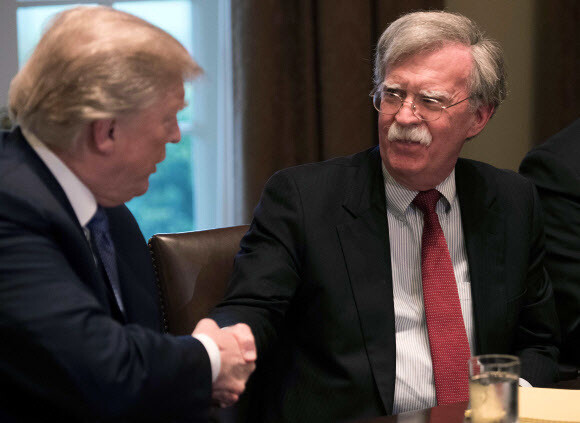hankyoreh
Links to other country sites 다른 나라 사이트 링크
Pompeo and Bolton offer different stances regarding North Korea’s denuclearization

On Apr. 29, US Secretary of State Mike Pompeo and National Security Advisor John Bolton – US President Donald Trump’s key advisors on foreign relations and security – both made TV appearances for the first time since the inter-Korean summit and offered a glimpse of US strategy leading up to the North Korea-US summit. The two figures did not appear to be on the same page, however: Pompeo, who met Kim at the beginning of April, adopted a more flexible stance and offered more optimistic predictions, while Bolton, a hardliner on North Korea, remained on his guard.
To begin with, Pompeo and Bolton disagreed about the timing when sanctions could be relaxed. During an interview with ABC News, Pompeo dodged a question about whether there might be any easing of sanctions before the “complete irreversible dismantlement” of North Korea’s nuclear program and said, “We’re going to do it in a fundamentally different way than the previous efforts to persuade the North Koreans to get rid of their nuclear weapons program. We have [. . .] our eyes wide open.”
When the same question was repeated, Pompeo repeated his answer about having “our eyes wide open.” This can be seen as implying that the US would consider easing sanctions to some extent in line with North Korea’s actions according to the principle of quid pro quo if the North agrees to the goal of denuclearization and a timeframe for achieving that.
This is a departure from the former stance of the current US administration, which has indicated that North Korea would not be rewarded until its complete denuclearization. White House Spokesperson Sarah Huckabee Sanders recently said that the US would continue its campaign against North Korea until its remarks led to “concrete actions.”
On a close reading, Sanders’ remarks seem to suggest that the intensity of sanctions could be relaxed even before complete denuclearization if North Korea some kind of “concrete actions.”
This contrasts with remarks made by Bolton during interviews with Fox News and CBS. When Bolton was asked whether “President Trump [will] insist that Kim give up, ship out, all of his nuclear weapons, all of his nuclear fuel, all of his ballistic missiles, before the US makes any concessions,” he said, “Yes, I think that’s what denuclearization means.”
This seems to imply that sanctions will not be relaxed until North Korea’s complete denuclearization.
The airing of the two officials’ disagreement raises concerns that the Trump administration has not yet settled on a definite roadmap to denuclearization. An alternate possibility is that Bolton is deliberately playing the role of the “bad cop.”
Pompeo and Bolton also offered rather different assessments of North Korea’s commitment to denuclearization. Pompeo said that the goal of his visit to North Korea was to “try and identify if there was a real opportunity there [for achieving denuclearization]. I believe there is.” He said that he and Kim “had a good conversation. We talked about serious matters. [. . .] We had an extensive conversation on the hardest issues that face our two countries,” adding that the discussion was “productive.” This shows that Pompeo places considerable trust in Kim’s commitment to denuclearization.

In contrast, Bolton put the focus on pressure by mentioning the Libyan model. “We have very much in mind the Libya model from 2003, 2004. There are obviously differences [between North Korea and Libya,” he said.
Bolton defined the Libyan model as consisting of rapid dismantlement of a nuclear program through inspections, suggesting that this would be on the agenda for the summit. If North Korea shows that it has made a strategic decision to give up its nuclear program, Bolton said, it should be possible to move as quickly as with Libya. The implication is that the US will ask the North to adopt a compressed timeline for denuclearization.
“The full, complete, total disclosure of everything related to their nuclear weapons program [. . . and . . .] verification by American and other inspectors [. . .] could be very important here,” Bolton also said. This suggests that the US will ask for inspections not only of the nuclear facilities that the North has disclosed but also its undisclosed facilities.
By Yi Yong-in, Washington correspondent
Please direct questions or comments to [english@hani.co.kr]

Editorial・opinion
![[Column] Has Korea, too, crossed the Rubicon on China? [Column] Has Korea, too, crossed the Rubicon on China?](https://flexible.img.hani.co.kr/flexible/normal/500/300/imgdb/original/2024/0419/9317135153409185.jpg) [Column] Has Korea, too, crossed the Rubicon on China?
[Column] Has Korea, too, crossed the Rubicon on China?![[Correspondent’s column] In Japan’s alliance with US, echoes of its past alliances with UK [Correspondent’s column] In Japan’s alliance with US, echoes of its past alliances with UK](https://flexible.img.hani.co.kr/flexible/normal/500/300/imgdb/original/2024/0419/2317135166563519.jpg) [Correspondent’s column] In Japan’s alliance with US, echoes of its past alliances with UK
[Correspondent’s column] In Japan’s alliance with US, echoes of its past alliances with UK- [Editorial] Does Yoon think the Korean public is wrong?
- [Editorial] As it bolsters its alliance with US, Japan must be accountable for past
- [Guest essay] Amending the Constitution is Yoon’s key to leaving office in public’s good graces
- [Editorial] 10 years on, lessons of Sewol tragedy must never be forgotten
- [Column] A death blow to Korea’s prosecutor politics
- [Correspondent’s column] The US and the end of Japanese pacifism
- [Guest essay] How Korea turned its trainee doctors into monsters
- [Guest essay] As someone who helped forge Seoul-Moscow ties, their status today troubles me
Most viewed articles
- 1[Column] The clock is ticking for Korea’s first lady
- 2After 2 months of delayed, denied medical care, Koreans worry worst may be yet to come
- 3[Column] Has Korea, too, crossed the Rubicon on China?
- 4[Editorial] When the choice is kids or career, Korea will never overcome birth rate woes
- 5[Correspondent’s column] In Japan’s alliance with US, echoes of its past alliances with UK
- 6Hong Se-hwa, voice for tolerance whose memoir of exile touched a chord, dies at 76
- 7US exploring options for monitoring N. Korean sanctions beyond UN, says envoy
- 8Samsung barricades office as unionized workers strike for better conditions
- 9US overtakes China as Korea’s top export market, prompting trade sanction jitters
- 10[Photo] Smile ambassador, you’re on camera